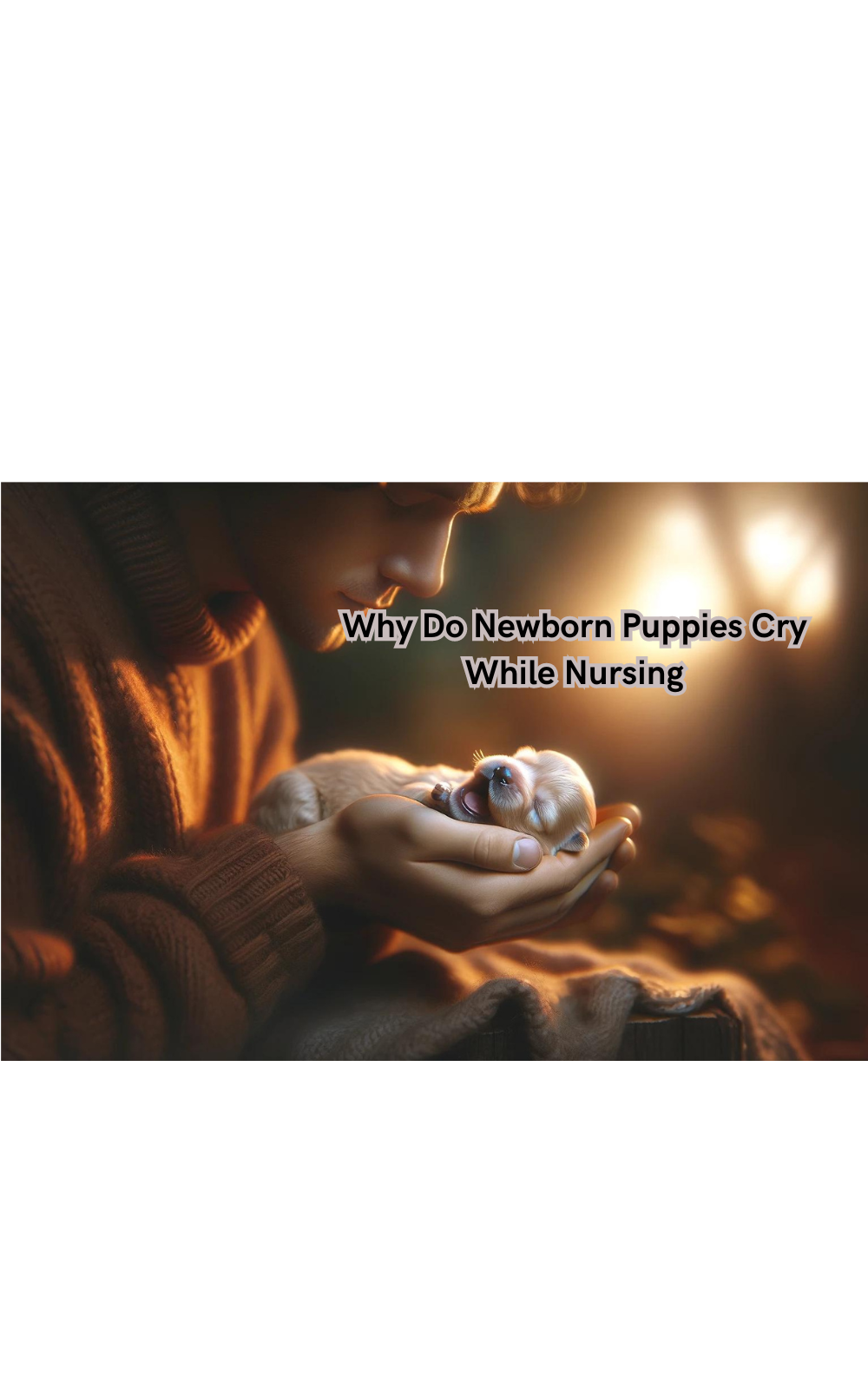Why Do Newborn Puppies Cry While Nursing
Exploring the underlying reasons behind this behavior can provide invaluable insights into nurturing and caring for these vulnerable animals during their early stages of development.

Welcoming a litter of newborn puppies into the world is a heartwarming experience, yet it's not uncommon for these adorable creatures to vocalize their needs through cries while nursing.
Understanding why newborn puppies cry during this crucial period ensures their well-being. This behavior often stems from instincts and serves as a means of communication, signaling hunger, discomfort, or the need for warmth.
Exploring the underlying reasons behind this behavior can provide invaluable insights into nurturing and caring for these vulnerable animals during their early stages of development.
The Importance of Nursing for Newborn Puppies
For newborn puppies, nursing is not just a source of nourishment; it's also a crucial aspect of their overall development.
Mother's milk provides essential nutrients that help boost their immune system and protect them from potential illnesses. Additionally, the act of nursing helps establish a strong bond between the mother and her pups, fostering a sense of security and comfort for the puppies.
Mom dog's milk is also rich in antibodies, providing passive immunity to newborns, which is essential as they are still building their immune systems. Mother dogs can also regulate their body temperature, keeping them warm and comfortable.
Newborn puppies have tiny stomachs and require frequent nursing throughout the day and night. It's common for them to nurse every 1-2 hours during their first few weeks of life. This constant milk intake ensures the puppies receive the nutrients for healthy growth and development.
Large breed dogs tend to have a larger litter, meaning more puppies compete for milk. This can result in some puppies not getting enough milk and becoming vocal about their needs through crying during nursing. Newborn puppy cries are their way of communicating to their mother that they need more milk and attention.
Why Do Newborn Puppies Cry While Nursing?
As mentioned earlier, crying during nursing is a natural and instinctual behavior for newborn puppies. However, there are specific reasons why they might cry while nursing, including:
Hunger:
This is the most common reason for newborn puppies crying during nursing. Newborn puppies crying out for their mother's milk is their way of telling her they are still hungry and need more food.
If you notice this happening, it's best to switch puppies between teats or even supplement with formula if necessary to ensure all the puppies are getting enough nourishment.
As their stomachs are tiny, they quickly empty after feeding, and the puppies may get hungry again within an hour or two. Most puppies suffering from hunger will latch onto their mother's teat continuously, trying to get more milk. Goat milk formula is an excellent alternative for newborns struggling to get enough milk from their mothers.
Adult dogs can also produce milk; in some cases, they may help nurse the litter if necessary. If a mother's milk supply is low, it's essential to consult a veterinarian for advice on supplementing and ensuring all puppies get enough food. Normal-appearing milk can sometimes be too watery or lacking in nutrients, so it's worth seeking professional advice.
Discomfort:
Sometimes, newborn puppies may cry during nursing due to physical discomfort. It could be because they are lying in an uncomfortable position or are being nudged by their siblings while trying to nurse.
If this occurs, gently reposition the puppy or separate them from their littermates during feeding time to ensure they can nurse without distractions. Milk from the mom dog can also cause stomach upset in some puppies, leading to crying during nursing. If you suspect this is the case, consult a veterinarian for proper guidance.
Need for warmth:
Newborn puppies cannot regulate their body temperature, and they rely on their mother's warmth to keep them comfortable.
If the room is too cold or if there are drafty areas near the nursing area, the newborns may cry out of discomfort from feeling chilly. Ensuring a warm and cozy environment for the mother and her puppies is crucial for their well-being. The puppies should be kept warm and should nurse frequently.
Whelping box heaters can also be used to provide additional warmth if necessary. Because young puppies have limited mobility, it's essential to ensure they are always warm and comfortable.
Bonding:
Crying during nursing can also be a way for the puppies to bond with their mother. It's not uncommon for newborns to cry while searching for their mother's teat, even if they are not hungry or uncomfortable. This behavior helps strengthen the bond between the puppies and their mother, ensuring they receive the care and attention they need.
Pet owners can also help facilitate this bond by regularly handling and interacting with the puppies. This helps familiarize them with the human touch and fosters a strong relationship between the puppies and their future owners.
These are just some of the reasons why newborn puppies may cry during nursing. While it's essential to understand these behaviors, it's also vital to seek a vet immediately if you notice any significant changes in a puppy's crying or nursing behavior.
Crying in Older Puppies
As puppies grow and develop, their nursing needs will change. Nursing frequency decreases as they start to eat solid food and wean off their mother's milk.
However, like humans, puppies can also go through growth spurts that may increase hunger and more frequent crying during nursing. This is normal and a sign that the puppy is growing and developing correctly.
If you notice your puppy crying during nursing, monitoring their weight gain and overall health is essential. If there are any concerns, consult a veterinarian for guidance on proper nutrition and feeding schedules.
How to Comfort A Crying Newborn Puppy
While newborn puppies crying during nursing is natural, there are ways to help comfort them and ease their discomfort. Here are a few tips:
- Ensure a warm and comfortable environment for both the mother and her litter.
- Try supplementing with formula or goat milk if necessary to ensure all puppies are getting enough nourishment.
- Reposition or separate the puppy from their siblings if they seem uncomfortable while nursing.
- Consult a veterinarian if you suspect any underlying medical issues causing discomfort or crying during nursing.
- Interact and handle the puppies regularly to help them bond with you and get used to human touch.
By understanding why newborn puppies cry during nursing and following these tips, you can ensure the health and well-being of these tiny creatures in their first few weeks of life.
What should I expect from the puppies during the first few weeks of life?
During the first few weeks of life, puppies rely heavily on their mother's milk for nourishment and warmth.
They will spend most of their time sleeping and nursing, with short periods of play and exploration as they grow and develop. It's essential to closely monitor their weight gain and overall health during this critical stage and provide a warm and comfortable environment for them to thrive in.
As they approach 3-4 weeks of age, they will begin the weaning process and start transitioning to solid food.
This is also a crucial time for socialization, as puppies will start to interact with their littermates and humans more frequently. Proper care during this stage sets the foundation for healthy growth and development in adult dogs.
FAQs
How do I know if puppies are getting enough milk?
Newborn puppies should gain weight consistently during the first few weeks of life. If you notice any significant weight loss or lack of weight gain, consult a veterinarian for guidance. Adequate milk supply can also be determined by observing the mother dog, as she may show signs of discomfort or have visible engorgement if there is an issue.
How many minutes should a puppy breastfeed?
Newborn puppies may only need to breastfeed for a few minutes, while older puppies may take longer. It's essential to monitor their weight gain and overall health rather than focus on each nursing session's length. Consult a veterinarian if you have concerns about your puppy's feeding habits.
Will newborn puppies cry if hungry?
Yes, newborn puppies may cry if hungry, but crying can also be a way to bond with their mother. It's essential to monitor their weight gain and overall health during the first few weeks of life to ensure they are receiving enough nourishment.
What are the signs of milk fever in dogs?
Milk fever, also known as eclampsia, is a condition that occurs when a lactating dog's body cannot produce enough calcium to support milk production. Signs include restlessness, panting, muscle tremors, and decreased appetite. If you suspect your dog has milk fever, seek veterinary care immediately, as it can be life-threatening.
Conclusion
Understanding why newborn puppies cry while nursing is crucial for their well-being. It's instinct for puppies to communicate through whining, but excessive or constant crying can indicate discomfort, hunger, or complications requiring veterinary attention.
Whether it's frustration with the milk flow, hunger, separation anxiety, or environmental factors, attentive caregiving is essential. Monitoring their feeding habits, ensuring warmth, and addressing any health concerns promptly is vital in caring for crying newborn puppies. Seeking veterinary advice for persistent crying or other concerning behaviors is paramount to safeguard their well-being.
By recognizing and responding to the reasons behind newborn puppy cries, caregivers can create a nurturing environment that supports their growth and development.
